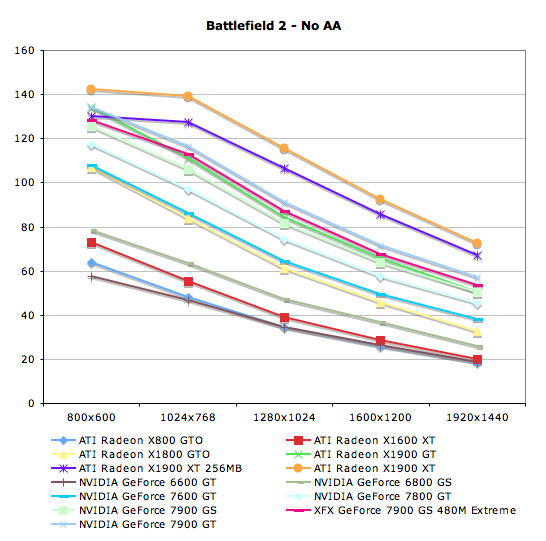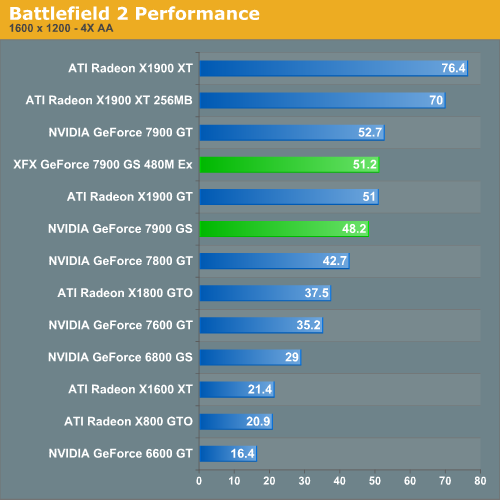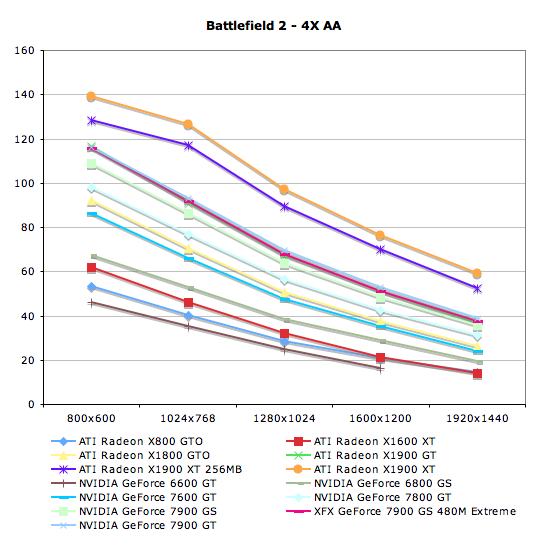Fall '06 NVIDIA GPU Refresh - Part I: GeForce 7900 GS
by Derek Wilson on September 6, 2006 9:00 AM EST- Posted in
- GPUs
Battlefield 2 Performance
This benchmark is performed using DICE's built in demo playback functionality with a few added extras built in house. When using the built in demo playback features of BF2, frames rendered during the loading screen are counted in the benchmark. In order to get a real idea of performance, we use the instantaneous frametime and frames per second data generated from a benchmark run. We discard the data collected during the loading screen and calculate a result that represents the actual gameplay that was benchmarked. While DICE maintains that results over 100fps aren't reliable, our methods have allowed us to get useful data from high performing systems.
During the benchmark, the camera switches between players and vehicles in order to capture the most action possible. There is a lot of smoke and explosions, so this is a very GPU intensive Battlefield 2 benchmark. The game itself is best experienced with average in-game framerates of 35 and up.
We ran Battlefield 2 using the highest quality graphics settings we could. Shadows, lighting, and especially view distance are very important in order to best play the game. In our opinion view distance should never be set to less than the max, but other settings can be decreased slightly if a little more performance or a higher resolution is required.

For a little less money, the overclocked 7900 GS delivers a little more performance than the X1900 GT under Battlefield 2. It seems like the X1900 GT may have a CPU limited advantage here, but at higher resolutions the XFX 7900 GS can deliver about 6% higher performance under the highest settings (without AA) for slightly less money. The X1900 GT is more competitive with the stock 7900 GS, but the advantage NVIDIA has in this case is in value.

| Battlefield 2 Performance - No AA | |||||
800x600 |
1024x768 |
1280x1024 |
1600x1200 |
1920x1440 |
|
| ATI Radeon X800 GTO | 63.9 |
48.2 |
34.3 |
25.8 |
18.6 |
| ATI Radeon X1600 XT | 72.9 |
55.4 |
39.1 |
28.6 |
20.1 |
| ATI Radeon X1800 GTO | 107.1 |
83.9 |
61.1 |
45.8 |
32.5 |
| ATI Radeon X1900 GT | 134 |
111.1 |
84.3 |
65.7 |
50.2 |
| ATI Radeon X1900 XT 256MB | 130.1 |
127.5 |
106.6 |
85.5 |
66.9 |
| ATI Radeon X1900 XT | 142.4 |
139.2 |
115.4 |
92.4 |
72.7 |
| NVIDIA GeForce 6600 GT | 57.7 |
46.5 |
34.6 |
26.4 |
18.7 |
| NVIDIA GeForce 6800 GS | 78.6 |
63.6 |
47.3 |
36.9 |
25.9 |
| NVIDIA GeForce 7600 GT | 108 |
86.3 |
64.3 |
49.3 |
38.2 |
| NVIDIA GeForce 7800 GT | 117.2 |
96.8 |
74.4 |
57.4 |
45.2 |
| NVIDIA GeForce 7900 GS | 125.4 |
105.9 |
81.8 |
63.9 |
50.2 |
| XFX GeForce 7900 GS 480M Extreme | 128.4 |
112.7 |
87.1 |
67.7 |
53.3 |
| NVIDIA GeForce 7900 GT | 134.2 |
116.6 |
91.2 |
71.8 |
57 |

With AA enabled, the X1900 GT closes the gap on the overclocked 7900 GS and outperforms the stock version. When all is said and done, the XFX 480M offers performance and value at least at the level of the X1900 GT in BF2. For those who wish to save the extra $20, the performance hit for not choosing the overclocked model is not huge. Which is the better deal will have to come down to personal preference and/or finance.

| Battlefield 2 Performance - 4X AA | |||||
800x600 |
1024x768 |
1280x1024 |
1600x1200 |
1920x1440 |
|
| ATI Radeon X800 GTO | 53.4 |
40.1 |
28.3 |
20.9 |
14.6 |
| ATI Radeon X1600 XT | 61.8 |
45.9 |
32.3 |
21.4 |
14.1 |
| ATI Radeon X1800 GTO | 92.2 |
70.4 |
50.6 |
37.5 |
26.1 |
| ATI Radeon X1900 GT | 116.6 |
91.4 |
67.2 |
51 |
36.8 |
| ATI Radeon X1900 XT 256MB | 128.2 |
117.2 |
89.4 |
70 |
52.6 |
| ATI Radeon X1900 XT | 139.2 |
126.5 |
97.3 |
76.4 |
59.4 |
| NVIDIA GeForce 6600 GT | 46.1 |
35.2 |
25 |
16.4 |
|
| NVIDIA GeForce 6800 GS | 67.2 |
52.7 |
38.3 |
29 |
19.6 |
| NVIDIA GeForce 7600 GT | 86.4 |
66.2 |
47.3 |
35.2 |
24.1 |
| NVIDIA GeForce 7800 GT | 97.9 |
77 |
56.7 |
42.7 |
31.2 |
| NVIDIA GeForce 7900 GS | 108.9 |
86.2 |
63.7 |
48.2 |
35.5 |
| XFX GeForce 7900 GS 480M Extreme | 115.6 |
91.7 |
67.6 |
51.2 |
37.7 |
| NVIDIA GeForce 7900 GT | 116.3 |
93.3 |
69.4 |
52.7 |
38.7 |










29 Comments
View All Comments
munky - Wednesday, September 6, 2006 - link
FEAR is a DX9 game, not OpenGL...
DerekWilson - Wednesday, September 6, 2006 - link
I'm looking into this at the moment but having trouble finding documentation on it.I suppose, as I was recently testing quad sli and saw huge performance increases, I assumed the game must be using the 4 frame afr mode only possible in opengl (dx is limited to rendering 3 frames ahead). I'll keep looking for confirmation on this ...
MemberSince97 - Wednesday, September 6, 2006 - link
Jupiter EX is a DX9 rendering engine...DerekWilson - Wednesday, September 6, 2006 - link
corrected, thanks ... now I have to figure out why FEAR likes quad sli so much ...MemberSince97 - Wednesday, September 6, 2006 - link
Nice writeup DW, I really like the mouseover performance % graphs...PrinceGaz - Thursday, September 7, 2006 - link
So do I, but there is one errorThat should be 14% and 25% advantages
The 7900GS has 20 PS while the 7900GT has 24 PS. That makes the 7900GS 20% slower than the 7900GT, but it makes the 7900GT 25% faster than the 7900GS. It's important to remember which one you're comparing it against when quoting percentages.
Hopefully the percentage performance difference in the graph itself was calculated correctly, or at least consistently.
PrinceGaz - Thursday, September 7, 2006 - link
Ooops sorry, please ignore my post. For some reason I thought for a moment the 7900GS had 16 PS and the 7900GT had 20 PS (despite writing the correct values in my comment). The article is correct, I was just getting confused.PS. an edit function would be nice.
Frackal - Wednesday, September 6, 2006 - link
There is no way an X1900xt gets 75fps at 1600x1200 4xAA, at that same resolution and AA setting I get well over 120-130fps average with an X1900xtx. Most sites show it hitting at least 100+DerekWilson - Wednesday, September 6, 2006 - link
if you use the built in demo features to run a timedemo with dice's own calculations you will get a very wrong (skewed upward) number. Dice themselves say that results over 100 fps aren't reliable.the problem is that they benchmark the load screen, and generally one card or the other will get better load screen performance -- for instance, the x1900 gt may get 300+fps while the 7900 gt may only get 200fps. (I just picked those numbers, but framerates for the load screen are well over 100 fps in most cases and drastically different between manufacturers).
not only does no one care about this difference on a load screen, but it significantly interferes with benchmark numbers.
the timedemo feature can be used to output a file with frametimes and instantaneous frames per second. we have a script that opens this file, removes the frame data for the load screen, and calculates a more accurate framerate average using only frame data for scenes rendered during the benchmark run.
this will decrease over all scores.
we also benchmark in operation clean sweep which has a lot of fog and water. we use a benchmark with lots of smoke and explosions and we test for some ammount of time in or near most vehicles.
splines - Wednesday, September 6, 2006 - link
Ownage approved.